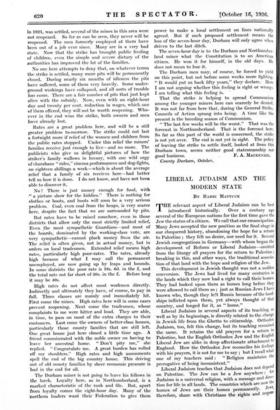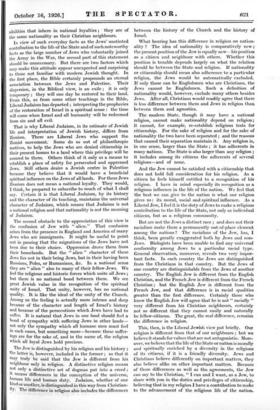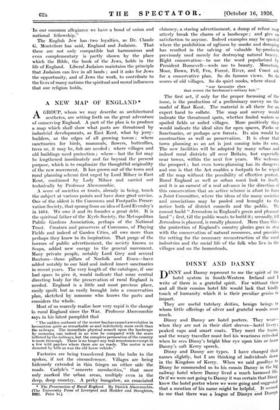LIBERAL JUDAISM AND TH E MODERN STATE
BY RABBI MATTUCK
THE relevant aspect of Liberal Judaism can be best introduced historically. Over a century ago several of the European nations for the first time gave the Jew the status of a citizen. We call that our emancipation. Many Jews accepted the new position as the final stage in our chequered history, abandoning the hope for a return to Palestine ; they felt no desire, nor need for it. Several Jewish congregations in Germany—with whom began the development of Reform or Liberal Judaism—omitted from the liturgy all prayers for the return to Palestine; breaking in this, and other ways, the traditional associa- tion of that land with the hope and religion of the Jew.
This development in Jewish thought was not a sudden conversion. The Jews had lived for many centuries in the lands which they now had a right to call their homes. They had looked upon them as homes long before they were allowed to call them so ; just as Russian Jews I have known who, though they left Russia because of the hard- ships inflicted upon them, yet always thought of that country, and longed for it, as " home."
Liberal Judaism in several aspects of its teaching, as well as by its beginnings, is directly related to the change in Jewish life from the Ghetto to citizenship. Orthodox Judaism, too, felt this change, but its teaching remained the same. It retains the old prayers for a return to Palestine, but the English Orthodox Jew and the English Liberal Jew are alike in deep affectionate attachment to England. How the Orthodox Jew reconciles his feelings with his prayers, it is not for me to say ; but I recall what one of my teachers said : " Religion maintains the prerogative of being inconsistent." Liberal Judaism teaches that Judaism does not depend on Palestine. The Jew can be a Jew anywhere ; for Judaism is a universal religion, with a message and direc- tion for life in all lands. The countries which are now the homes of Jews are their homes permanently. Jews, therefore, share with Christians the rights and resP°11. sibilities that inhere in national loyalties ; - they are of the same nationality as their Christian neighbours.
In view of such everyday facts as the Jews' unstinted contribution to the life of the State and of such noteworthy facts as the large number of Jews who voluntarily joined the Army in the War, the second part of this statement should be unnecessary. But there are two factors which may make this attitude appear unexpected and surprising to those not familiar with modern Jewish thought. In the first place, the Bible certainly propounds an eternal association between the Jews and Palestine. Their dispersion, in the Biblical view, is an exile ; it is only temporary ; they will one day be restored to their land. From this, as from some other teachings in the Bible, Liberal Judaism has departed ; interpreting the prophecies of the restoration of Israel in a spiritual sense : the time will come when Israel and all humanity will be redeemed from sin and all evil.
That is why Liberal Judaism, in its estimate of Jewish life and interpretation of Jewish history, differs from Zionism. There are Liberal Jews who support the Zionist movement: Some do so out of philanthropic motives, to help the Jews who are denied citizenship in their present homes to a land where this privilege will be assured to them. Others think of it only as a means to establish a place of safety for persecuted and oppressed Jews. Still others desire a Jewish centre in Palestine because they believe that it would have a beneficial spiritual influence on the Jews of all lands. For these Jews Zionism does not mean a national loyalty. They would, I think, be prepared to subscribe to much of what I shall say. Certain it is that Liberal Judaism, by its history and the character of its teaching, maintains the universal character of Judaism, which means that Judaism is not a national religion and that nationality is not the meaning of Judaism.
The second obstacle to the appreciation of this view is the confusion of Jew with " alien." That confusion arises from the presence in England and America of many Jews who are immigrants. It might be useful to point out in passing that the migrations of the Jews have not been due to their choice. Oppression drove them from their homelands. But the " alien " character of these Jews lies not in their being Jews, but in their having been Russians, Poles, or Rumanians, &c. In a national sense they are " alien " also to many of their fellow-Jews. We feel the religious and historic forces which unite all Jews ; but there is no national bond between them. We see great Jewish value in the recognition of the spiritual unity of Israel. That unity, however, has no national quality. It is like the ideal of the unity of the Church. Among us the feeling is actually more intense and deep because of the character and length of Israel's history and because of the persecutions which Jews have had to suffer. It is natural that Jews in one land should feel a bond of sympathy with suffering Jews in other lands— not only the sympathy which all humane men must feel in such cases, but something more—because these suffer- ings are for the sake of, and in the name of, the religion which all loyal Jews hold precious.
The Jew is distinguished by his religion and his history ; the latter is, however, included in the former ; so that it may truly be said that the Jew is different from his neighbour only in religion. A distinctive religion means not only a distinctive set of dogmas put into a creed ; it means differences in the conception of the universe, human life and human duty. Judaism, whether of one kind or another, is distinguished in this way from Christian- ity. The difference in religion also includes the differences between the history of the Church and the history of Israel.
What bearing has this difference in religion on nation- ality ? The idea of nationality is comparatively new ; the present position of the Jew is equally new—his position as a citizen and neighbour with others. Whether this position is tenable depends largely on what the relation should be between the State and religion. If nationality or citizenship should mean also adherence to a particular religion, the Jews would be automatically excluded. If only those can be Englishmen who are Christians, the Jews cannot be Englishmen. Such a definition of nationality would, however, exclude many others besides Jews. After all, Christians would readily agree that there is less difference between them and Jews in religion than between them and agnostics.
The modern State, though it may have a national religion, cannot make nationality depend on religion; it cannot, for example, re-establish religious tests for citizenship. For the sake of religion and for the sake of nationality the two have been separated ; and the reasons that caused their separation maintain it. Any religion is, in one sense, larger than the State ; it has adherents is many nations. The State is also larger than any religion ; it includes among its citizens the adherents of several religions—and of none.
And the Jew cannot be satisfied with a citizenship that does not hold full consideration for his religion. As a citizen he feels himself entitled to a recognition of his religion. I have in mind especially its recognition as a religious influence in the life of the nation. We feel that the best we can give to the nation is what our religion gives us : its moral, social and spiritual influence. As a Liberal Jew, I feel it is the duty of Jews to make a religious contribution to the life of the State, not only as individual citizens, but as a religious community.
But are not the Jews a distinct race ; and does not their racialism make them a permanently out-of-place clement among the nations ? The racialism of the Jew, has, I think, been greatly exaggerated both by Jews and non- Jews. Biologists have been unable to find any universal conformity among Jews to a particular racial type. General observation, moreover, reveals two very impor- tant facts. In each country the Jews are distinguished from the Christians in that country. But the Jews of one country are distinguishable from the Jews of another country. The English Jew is different from the English Christian, and the French Jew is different from the French Christian ; but the English Jew is different from the French Jew, and that difference is in racial qualities greater than the first difference. Certainly those who know the English Jew will agree that he is not " racially " very different from his Christian neighbours, certainly not so different that they cannot easily and naturally be fellow-citizens. The great, the real difference, remains the difference in religion.
This, then, is the Liberal Jewish view put briefly. Our religion is different from that of our neighbours ; but we believe it stands for values that are not antagonistic. More- over, we believe that the life of the State or nation is morally and spiritually enriched by a diversity in the religions of its citizens, if it is a friendly diversity. Jews and Christians believe differently on important matters, they also believe alike on other important matters. Because of those differences as well as the agreements, the Jew can say to the Christian, " I can and I want, as a Jew, to share with you in the duties and privileges of citizenship, believing that in my religion I have a contribution to make to the advancement of the religious life of the nation. In our common allegiance we have a bond of union and national fellowship."
The English Jew has • two loyalties, as Dr. Claude G. Montefiore has said, England and Judaism. That these are not only compatible but harmonious and even complementary is partly shown by the place which the Bible, the book of the Jews, holds in the life of England. Liberal Judaism maintains the principle that Judaism can live in all lands ; and it asks for Jews the opportunity, and of Jews the work, to contribute to the lives of many nations the spiritual and moral influences that our religion holds.
























































 Previous page
Previous page